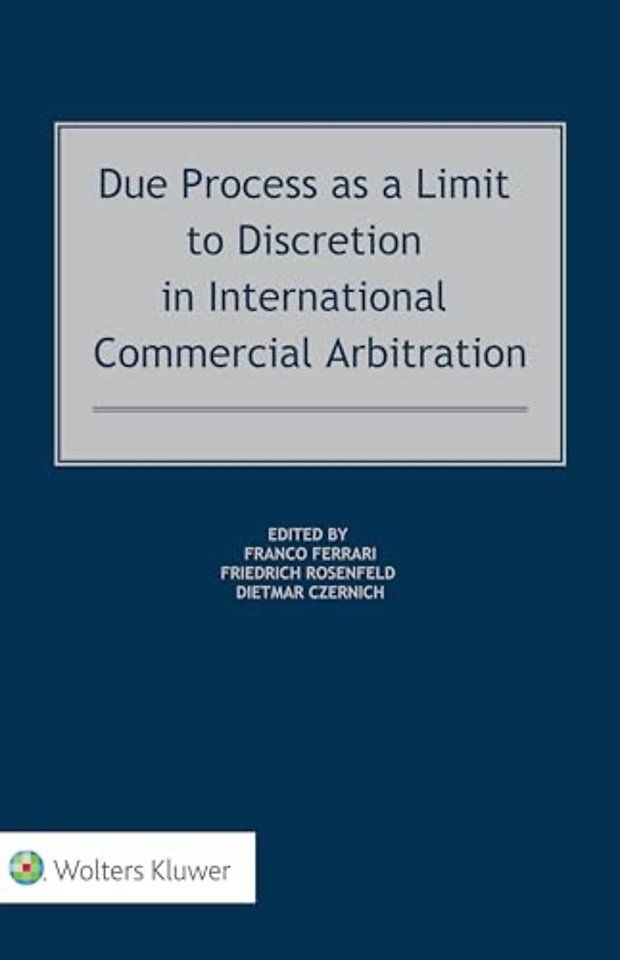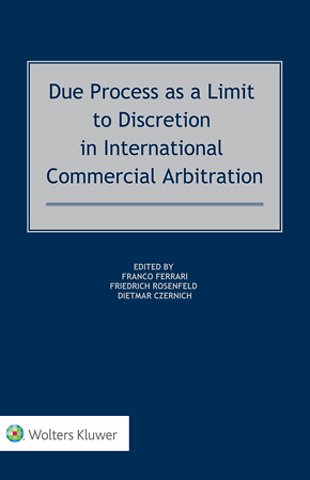Due Process as a Limit to Discretion in International Commercial Arbitration
Samenvatting
About this book:
Due Process as a Limit to Discretion in International Commercial Arbitration is a nonpareil book that contains an expansive analysis of due process in key jurisdictions around the world. Owing to the dearth of consistent case law on due process, recalcitrant parties have been motivated to misuse due process arguments as a strategic tool, thereby putting at risk the prospect of obtaining an enforceable award in expeditious proceedings. Countering this inherent danger, this unique book offers a comprehensive study on due process as a limit to arbitral discretion.
What’s in this book:
Based on country reports prepared by leading arbitration practitioners and academics and a detailed general report authored by the editors, this book guides through the relevant case law on due process as a limit to discretion in arbitration and explores how courts in major arbitration jurisdictions apply due process guarantees when performing their post-award review. The following matters are elucidated:
- the right to be heard and how it may be affected by submission deadlines, evidentiary offers by the opposing party, and directions to the parties as to which aspects require further pleading;
- the right to be treated equally and its interplay with the duty to give each party full opportunity to present its case and to comment on submissions and evidence filed by the other party;
- the duty to effect proper notice, including delivery and language issues;
- the independence and impartiality of arbitrators with a focus on when an arbitrator’s conduct can become the basis for a successful challenge; and
- courts’ standards of deference when examining issues arising at the post-award stage.
How this will help you:
A significant addition to the debate regarding the so-called due process paranoia affecting arbitral tribunals, this exceptional book furnishes not only practical guidelines for the maintenance of a balance between due process and efficiency but also shows how to counteract the misuse of due process arguments in arbitration proceedings. As such, it will be highly appreciated by counsel, arbitrators, and judges from all countries, as well as by academics and researchers concerned with international commercial arbitration.
Specificaties
Inhoudsopgave
Contributors
Editors’ Note
Chapter 1 General Report
Dietmar Czernich, Franco Ferrari & Friedrich Rosenfeld
Chapter 2 Country Report Argentina
Julio César Rivera Jr
Chapter 3 Country Report Brazil
Rafael Francisco Alves
Chapter 4 Country Report Canada
Andrea K. Bjorklund & Benjamin R. Jarvis
Chapter 5 Country Report China
Zheng Tang
Chapter 6 Country Report the Republic of Cyprus
Soterios Loizou
Chapter 7 Country Report France
Caroline Kleiner
Chapter 8 Country Report Germany
Friedrich Rosenfeld
Chapter 9 Country Report Hong Kong
Z.J. Jennifer Lim & Charlotte Lelong
Chapter 10 Country Report India
Aditya Singh & Zehaan Trivedi
Chapter 11 Country Report Italy
Francesca Ragno
Chapter 12 Country Report Japan
Koji Takahashi
Chapter 13 Country Report Middle East
Nayla Comair-Obeid & Zeina Obeid
Chapter 14 Country Report the Netherlands
Jacob B. van de Velden & Abdel Khalek Zirar
Chapter 15 Country Report Norway
Giuditta Cordero-Moss
Chapter 16 Country Report Russia
Mikhail Batsura
Chapter 17 Country Report Singapore
Jonathan Lim
Chapter 18 Country Report Switzerland
Simon M. Hohler
Chapter 19 Country Report United Kingdom
Hattie R. Middleditch
Chapter 20 Country Report the United States of America
Ina C. Popova & Duncan Pickard
Index
Anderen die dit boek kochten, kochten ook
Net verschenen
Rubrieken
- aanbestedingsrecht
- aansprakelijkheids- en verzekeringsrecht
- accountancy
- algemeen juridisch
- arbeidsrecht
- bank- en effectenrecht
- bestuursrecht
- bouwrecht
- burgerlijk recht en procesrecht
- europees-internationaal recht
- fiscaal recht
- gezondheidsrecht
- insolventierecht
- intellectuele eigendom en ict-recht
- management
- mens en maatschappij
- milieu- en omgevingsrecht
- notarieel recht
- ondernemingsrecht
- pensioenrecht
- personen- en familierecht
- sociale zekerheidsrecht
- staatsrecht
- strafrecht en criminologie
- vastgoed- en huurrecht
- vreemdelingenrecht







